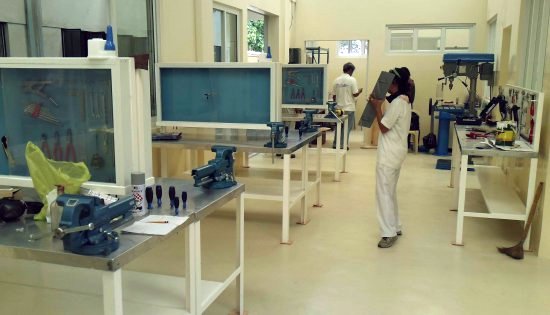Amputees to benefit
from latest technology at Davao facility
|

Davao
Jubilee Foundation's new workshop is fully equipped to produce
durable and affordable prosthetic devices made of polypropylene. DJF received ICRC support to build the workshop designed to use
the new polypropylene technology. (photo by ICRC/ Hardy Ladaw) |
By ICRC
March
30, 2012
MANILA – Amputees
can now walk proudly with durable and affordable prostheses made
possible by the use of the latest technology at Davao Jubilee
Foundation (DJF).
With support from the
International Committee of the Red Cross (ICRC), DJF opened its newly
constructed workshop today as it shifts to state-of-the-art
technology. The workshop is now fully equipped to produce lightweight
artificial legs and braces made of polypropylene, instead of heavier
fibreglass.
"Polypropylene is
relatively cheap and easy to process. It is versatile and recyclable,
and has a long shelf life. It also requires few other materials in the
manufacturing process," said Jean-François Gallay, the ICRC's
regional physical rehabilitation project manager. "The technology that
we use makes it possible to adapt assistive devices more precisely to
the needs of each individual patient, which makes the devices more
comfortable to use."
"This new technology
will be of significant help to patients as they regain their
independence and dignity," added Mr Gallay.
He said that
production time using the new technology will be considerably shorter
and that DJF will therefore be able to accommodate more patients.
The ICRC has been
providing DJF with support enabling it to enhance its prosthetic
services, which are one of the main needs of people physically
disabled by injuries resulting from armed conflict. Last year, the
ICRC built a gait training area where patients could practise using
their new prostheses.
DJF is a non-profit
organization that provides physical rehabilitation services to
amputees and other people with disabilities. It mainly helps people
from Mindanao, a region affected by conflict and insecurity. The ICRC
has been sending war-wounded patients to the foundation since 2000.
"It’s about time we
made the shift to polypropylene technology. It provides better quality
devices and serves the needs of patients at reduced cost," said
Glorycel Lasquite, a prosthetist-orthotist, one of two DJF staff
sponsored by the ICRC for specialized training in Cambodia.
In addition to the
assistance it is giving to DJF and its staff, the ICRC is providing
financial help for the physical rehabilitation of two minors whose
legs were amputated after a bomb blast in 2010. One of them, a
six-year-old boy who previously used fibreglass prostheses to walk and
run about, has benefited from new and lighter artificial limbs.
The ICRC is a neutral
and impartial humanitarian organization that assists and protects
victims of armed conflict and other situations of violence. In the
Philippines, it visits detainees and assists people displaced by
decades of internal armed conflict.
The ICRC provides
medicines and surgical items to 22 hospitals throughout Mindanao, and
helps cover the equipment needs of key hospitals. In addition, it
finances the treatment of individual patients in vulnerable cases.
The ICRC also works
with jail authorities to help improve health-care infrastructure in
places of detention, and with civilian and military health staff to
perfect their skills in areas such as war surgery and burns
management.